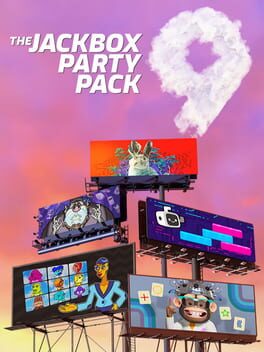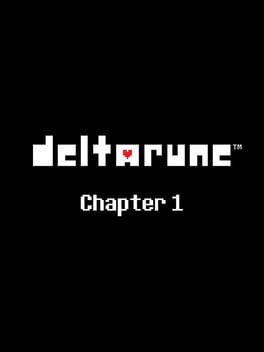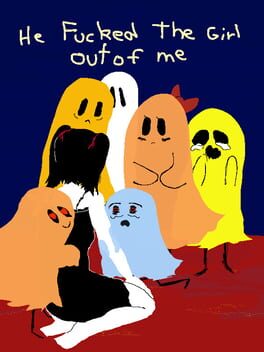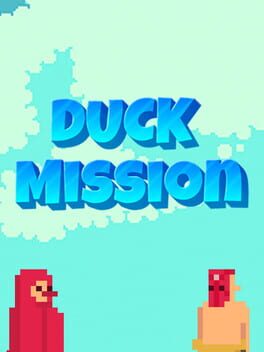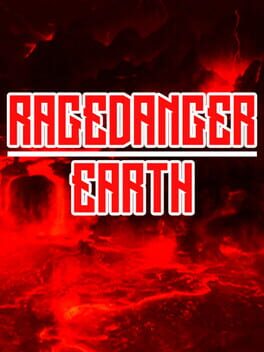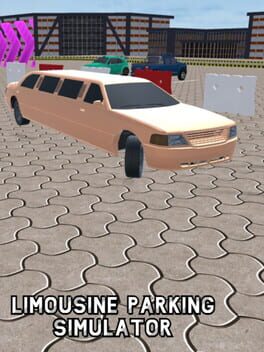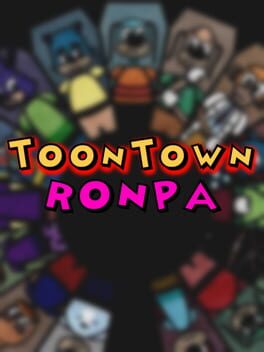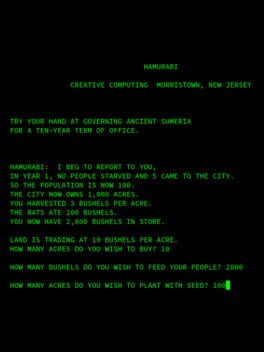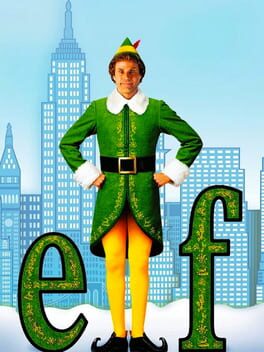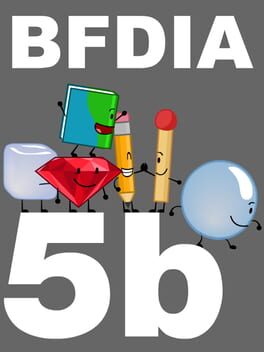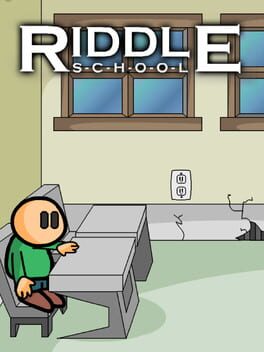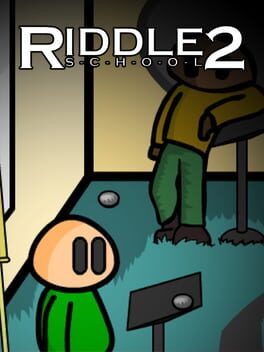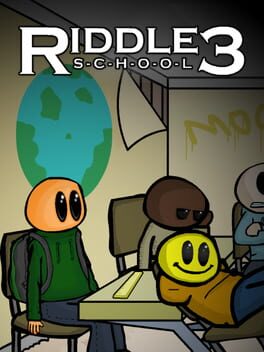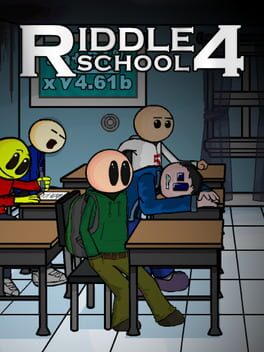hereweare
2013
I remember having fun with this game when I first discovered it, the few free games you got a day was honestly very generous, and it was more than enough with the way I played this game. In my opinion it's best experienced in a very meticulous, slow way - walking around, picking up little clues, searching (or not searching) little details from license plates, languages, business names - even when I completely missed the bar the process of finding these little trivia bits about little nooks of the world felt like a nice exercise almost in appreciation of the world. I don't really play it nowadays for no particular reason - when I have a rare urge to walk around in Google Maps I just prefer to walk around in Google Maps with no strings attached - but this game has been around for long enough to develop a meta, which has really soured my opinion on this game.
Criticizing a game for its fanbase is a bit shallow and I do have some apprehension about it, but the game itself has definitely acquiesced to the demands of this new wave of players and as such it's worth talking about. All I have to say is I really, really don't like competitive Geoguessr, it's antithetical to the way I appreciate the game, and some random georainbolt clip always seems to find its way to my eyes on social media, I have him blocked on like every site that we both use.
Of course, even talking about it as long as I have is overexaggerating the seriousness of this opinion, it's not an affront to me or anything, it's just a game I don't play anymore has evolved in a way that makes me want to play it even less.
Criticizing a game for its fanbase is a bit shallow and I do have some apprehension about it, but the game itself has definitely acquiesced to the demands of this new wave of players and as such it's worth talking about. All I have to say is I really, really don't like competitive Geoguessr, it's antithetical to the way I appreciate the game, and some random georainbolt clip always seems to find its way to my eyes on social media, I have him blocked on like every site that we both use.
Of course, even talking about it as long as I have is overexaggerating the seriousness of this opinion, it's not an affront to me or anything, it's just a game I don't play anymore has evolved in a way that makes me want to play it even less.
Jackbox has always been a complicated series. The quality of any given "pack" is pretty much completely random; the early entry of 3 was my favourite for the longest time but there are enough good games peppered throughout the series (Survive the Internet, Dictionarium, Talking Points, etc...) that I pretty much always have my finger on the pulse of the series, waiting for more fun little nuggets. This was probably the first Jackbox I didn't see come out when it came out, but I'm so glad I came around to it because this is the most consistent Jackbox game since 3 and probably has the trajectory to become my favourite in the series.
I played a session with friends, and we pretty much just worked our way down the list in the main menu, I'll give my thoughts on the games in the order I played them, except for Quixort - I played it last, but it's the only bad one and I wouldn't want to end a review of such a great game on a sour note; the best Jackbox games give a lot of wiggle room for their players to be creative and this one doesn't, it has pretty much no unique player input, nor does it have the high stakes that make something like Trivia Murder Party exciting, not to mention how much it relies on the dumb luck of someone on your team knowing your subject and just being able to direct the team.
That aside, the first one we played was Junktopia. This one was a lot of fun, I usually don't care that much about the themes of Jackbox games but this one was a lot of fun, it frames the gameplay well and the spell names in the glass ball are funny. It's kind of like Talking Points but with more individual direction, you buy one of a few random items from this junk store, come up with a name and two facts about it, then present the item to the other players who rate its quality. This one is a lot of fun, the timers are quick enough so you get to write a little synopsis of your item very quickly without any presentation feeling too rehearsed.
The next one is Fibbage 4. In this particular session I played the stock Fibbage 4, but I played a game of Fibbage Enough About You in another server a bit before I played any other game in the pack. This one is a lot of fun too; in practice this one should be pretty bad - winning the game and being funny are constantly at odds with each other - but against all odds this adds to the quality of the game, choosing whether you want to make your response silly or misleading in the stock gamemode is honestly a lot of fun and we got a lot of hilarious responses out of it. Enough About You leans a bit more towards the silliness, and the outright trivia intermission is a bit uncalled for, but this one is a lot of fun too.
Next up is Nonsensory. I was really surprised with this one, I was honestly expecting this one to be the second worst (beat out by Quixort, obviously), the presentation made it look pretty obtuse. Fortunately, however, I was wrong. It took me a bit to understand this one, but in essence someone has to fill in a prompt (e.g. advice a knight would give to his apprentice) with a given level of confidence for the person giving the advice, then the other players have to guess the confidence. It sounds really convoluted but it ended up being a lot of fun, especially in the later rounds as drawings are introduced which take the percentage deals to a whole new height.
And finally, Roomerang. Oh, Roomerang. Quiplash was my favourite Jackbox game for the longest time, but this honestly has it beat for the sheer extent which it lets its players mold it in their hands. The art direction is great, it's always high stakes, and the player traits and the prompts are so open that you and your friends can take them in any direction you want, and it is a complete delight.
Really glad to have played this one, I highly recommend it to anyone who likes the general conceit of Jackbox - or, hell, even as an introduction to the series it covers most grounds with the exception of not really having any games that feature a lot of drawing.
I played a session with friends, and we pretty much just worked our way down the list in the main menu, I'll give my thoughts on the games in the order I played them, except for Quixort - I played it last, but it's the only bad one and I wouldn't want to end a review of such a great game on a sour note; the best Jackbox games give a lot of wiggle room for their players to be creative and this one doesn't, it has pretty much no unique player input, nor does it have the high stakes that make something like Trivia Murder Party exciting, not to mention how much it relies on the dumb luck of someone on your team knowing your subject and just being able to direct the team.
That aside, the first one we played was Junktopia. This one was a lot of fun, I usually don't care that much about the themes of Jackbox games but this one was a lot of fun, it frames the gameplay well and the spell names in the glass ball are funny. It's kind of like Talking Points but with more individual direction, you buy one of a few random items from this junk store, come up with a name and two facts about it, then present the item to the other players who rate its quality. This one is a lot of fun, the timers are quick enough so you get to write a little synopsis of your item very quickly without any presentation feeling too rehearsed.
The next one is Fibbage 4. In this particular session I played the stock Fibbage 4, but I played a game of Fibbage Enough About You in another server a bit before I played any other game in the pack. This one is a lot of fun too; in practice this one should be pretty bad - winning the game and being funny are constantly at odds with each other - but against all odds this adds to the quality of the game, choosing whether you want to make your response silly or misleading in the stock gamemode is honestly a lot of fun and we got a lot of hilarious responses out of it. Enough About You leans a bit more towards the silliness, and the outright trivia intermission is a bit uncalled for, but this one is a lot of fun too.
Next up is Nonsensory. I was really surprised with this one, I was honestly expecting this one to be the second worst (beat out by Quixort, obviously), the presentation made it look pretty obtuse. Fortunately, however, I was wrong. It took me a bit to understand this one, but in essence someone has to fill in a prompt (e.g. advice a knight would give to his apprentice) with a given level of confidence for the person giving the advice, then the other players have to guess the confidence. It sounds really convoluted but it ended up being a lot of fun, especially in the later rounds as drawings are introduced which take the percentage deals to a whole new height.
And finally, Roomerang. Oh, Roomerang. Quiplash was my favourite Jackbox game for the longest time, but this honestly has it beat for the sheer extent which it lets its players mold it in their hands. The art direction is great, it's always high stakes, and the player traits and the prompts are so open that you and your friends can take them in any direction you want, and it is a complete delight.
Really glad to have played this one, I highly recommend it to anyone who likes the general conceit of Jackbox - or, hell, even as an introduction to the series it covers most grounds with the exception of not really having any games that feature a lot of drawing.
2018
In short - Undertale walked so Deltarune could run. And as much as I hate to start by not even talking about the game, my Deltarune story starts with my Undertale story.
Undertale has always been a complicated game for me. I'm sure near everyone reading this was around during late 2015 and 2016, where the game seemed to be in everyone's head, universally adored by critics and audiences alike. I think it was the first time I really felt a game's release - games had come out in my sightlines and I had some cognition of games being recieved by audiences, but it was something else entirely to see the utter cyclone that was Undertale - and my recently made Steam page and identification as a "gamer" (gag) - someone who, though I hadn't put it in such words yet, was making the baby steps towards seeing games as holistic, intentionally constructed experiences made by people as opposed to CDs that I had in my house that let me do things - I was pretty psyched to give Undertale a spin, and played it maybe about a month after it came out.
And honestly? I wasn't impressed. I'm still not, really.
My opinions on Undertale still elude me to an extent, perhaps due to its public image as this laureled gem of a game. When I first played it, I remember "liking" it for a bit, and during this bit if you asked me why I liked it I don't think I'd be able to give you much in the way of an answer. I liked the shmup mechanics, I liked the story, the idea of Souls, I liked that it was a game that called into question the way people tend to go through games - albeit more in a specific way I'll get to later. There were bits and pieces I liked in a vacuum, but as a whole it rang hollow for me. I tend to get it a lot more with music than games - probably just because that's a medium I've spent far more time intellectually engaging in than games - but the "vibes" of a thing is a very important consideration for me, and Undertale is not that. The world is saccharine, and there's lots of silly text gags and cute creatures, but it all felt incredibly surface-level to me, and nowadays (ignoring the fact it's been a while since I replayed it) the game feels incredibly surface-level, with the addition of being preachy. It's in the marketing; the RPG where you don't have to hurt anyone.
I bring the failures of this game up first to relish in how Deltarune succeeds.
I played Deltarune - chapters 1 and 2 - this year. I bring this up to acknowledge how my mindset going in was definitely some kind of contributor to how I viewed this game. By the time I dipped my toes into Deltarune, the iron was cold. There was no discourse, the swarm of first-playthroughs had come and gone and left little in my head. When I told my friends I was going through it, I got some nice comments and some "finally", but there was no pressure in my experience here. I wasn't racing to engage with other fans of the game, and I certainly wasn't pressing against the Twitter posts. I think it's telling that the only thing I remembered about Deltarune chapter 1, at all, was that Sans was apparently back.
As I booted up the game for the first time, and went through the character creation, I wasn't sure how to feel. Looking through the options, mulling over the hair and the shirts, other than the notably improved spritework from Undertale, I was on the edge of my seat waiting for the character of the game to present itself. Of all the customization options, "GIVE [YOUR CHARACTER] A GIFT" was probably the most compelling, I gave it an honest thought and thought this vague, broad strokes way of making a character was really fascinating. And then, as my character began to wake up, I heard Toriel calling.
"Kris!"
Undertale lets you have a name - you get to see it everytime you pause or save the game - and I think a thing like that is indicative of how the two games deal with the idea of the player being some voyeuristic interloper in this universe. In Undertale, you have a name that is very much used in the game, especially in its more meta moments. By even giving you this name, it gives you a stake in this world, and by extension of that tips the scale in favour of you acting selfishly within this world. Deltarune (well, chapter 1 of Deltarune), very intentionally pulls this rug from under your feet immediately, and never gives it back. Kris is Kris, and you are you. You are very strictly not a part of this world, and I love this change. It goes more in the direction of engaging with the fiction of this world by playing the game being a dubious action in and of itself (à la the amazing OFF which I ought to talk about at some point) which I find a lot more fascinating then the game constantly goading you that you'd better be nice, or else!! Deltarune just kind of drops you in this world, and when characters talk about the virtues of retaliation or non-violence it feels a lot more like the characters just being themselves to Kris rather than giving you a personal lesson about being kind to others.
As I dropped into Kris' bedroom, I found myself looking everywhere, marvelling at all the details. The spritework is remarkably better than Undertale, and it shows everywhere. I was enamored with Toriel's house, all its details and its little inspect boxes. I feel like the increase in frequency of more banal text boxes adds a lot to this more sobered game experience, it feels like someone actually looking in a room and taking in the details rather than a game trying to constantly endear itself to you.
As I go to the school, and enter the Dark World, my point-by-point analysis of the game kind of begins to falter, but the resounding quality of Deltarune is still there. This game has so much love, so much soul behind it. I actually laughed consistently at the dialogue and effects whereas in Undertale I hardly so much as smiled at any of the goofy moments. The battles here feel dynamic and amazing. The shmup segments are wild and wonderful, and managing an entire team of characters with unique abilities adds an unexpected amount of depth to even a completely pacifistic run. The secret boss, Jevil, very well might be the most fun I've had doing a boss battle in years. He took me 6 attempts to beat, probably about an hour and a half of work, but it was so ecstatic the whole way through. His attacks are frenetic and exciting, the level of engagement I had in the strategic planning was unmatched. I honestly wish a battle of that caliber could go on longer, be tougher just for me. Deltarune rewards you in spades for exploring its world, and I can't get enough of it!! I wish I could keep drooling about how much I love the battles and the characters in this game but past a certain point I would just be running in circles.
The intermission after the game, where you get back to your world and just get to walk around town and talk to everyone, was really nice, the vibe was unmatched. Most of these characters are (relative) one-offs from Undertale, and yet I walked to every single location, some of them tantalizingly closed off for now, some of them open and bustling. I talked to every NPC in the town, and it was a joy, even if I didn't need to do something like that. Deltarune chapter 1 is honestly front to back just a really fun experience, something Undertale had trouble consistently being for me. But, as I guided Kris home, and he got into his bed, something happened.
The scene of Kris tearing out the Soul from his body and moving, finally, without my input, was genuinely flooring. Was I a parasite here? Was I not welcome? How is this going to turn out? If I write about chapter 2 (which I have played, I'm as excited for 3 as you), I hope I can eulicidate the specific bits and pieces of that chapter too.
A lot of games tried to be Undertale after it came out, but I think all we needed was the Undertale team to give it another swing.
Undertale has always been a complicated game for me. I'm sure near everyone reading this was around during late 2015 and 2016, where the game seemed to be in everyone's head, universally adored by critics and audiences alike. I think it was the first time I really felt a game's release - games had come out in my sightlines and I had some cognition of games being recieved by audiences, but it was something else entirely to see the utter cyclone that was Undertale - and my recently made Steam page and identification as a "gamer" (gag) - someone who, though I hadn't put it in such words yet, was making the baby steps towards seeing games as holistic, intentionally constructed experiences made by people as opposed to CDs that I had in my house that let me do things - I was pretty psyched to give Undertale a spin, and played it maybe about a month after it came out.
And honestly? I wasn't impressed. I'm still not, really.
My opinions on Undertale still elude me to an extent, perhaps due to its public image as this laureled gem of a game. When I first played it, I remember "liking" it for a bit, and during this bit if you asked me why I liked it I don't think I'd be able to give you much in the way of an answer. I liked the shmup mechanics, I liked the story, the idea of Souls, I liked that it was a game that called into question the way people tend to go through games - albeit more in a specific way I'll get to later. There were bits and pieces I liked in a vacuum, but as a whole it rang hollow for me. I tend to get it a lot more with music than games - probably just because that's a medium I've spent far more time intellectually engaging in than games - but the "vibes" of a thing is a very important consideration for me, and Undertale is not that. The world is saccharine, and there's lots of silly text gags and cute creatures, but it all felt incredibly surface-level to me, and nowadays (ignoring the fact it's been a while since I replayed it) the game feels incredibly surface-level, with the addition of being preachy. It's in the marketing; the RPG where you don't have to hurt anyone.
I bring the failures of this game up first to relish in how Deltarune succeeds.
I played Deltarune - chapters 1 and 2 - this year. I bring this up to acknowledge how my mindset going in was definitely some kind of contributor to how I viewed this game. By the time I dipped my toes into Deltarune, the iron was cold. There was no discourse, the swarm of first-playthroughs had come and gone and left little in my head. When I told my friends I was going through it, I got some nice comments and some "finally", but there was no pressure in my experience here. I wasn't racing to engage with other fans of the game, and I certainly wasn't pressing against the Twitter posts. I think it's telling that the only thing I remembered about Deltarune chapter 1, at all, was that Sans was apparently back.
As I booted up the game for the first time, and went through the character creation, I wasn't sure how to feel. Looking through the options, mulling over the hair and the shirts, other than the notably improved spritework from Undertale, I was on the edge of my seat waiting for the character of the game to present itself. Of all the customization options, "GIVE [YOUR CHARACTER] A GIFT" was probably the most compelling, I gave it an honest thought and thought this vague, broad strokes way of making a character was really fascinating. And then, as my character began to wake up, I heard Toriel calling.
"Kris!"
Undertale lets you have a name - you get to see it everytime you pause or save the game - and I think a thing like that is indicative of how the two games deal with the idea of the player being some voyeuristic interloper in this universe. In Undertale, you have a name that is very much used in the game, especially in its more meta moments. By even giving you this name, it gives you a stake in this world, and by extension of that tips the scale in favour of you acting selfishly within this world. Deltarune (well, chapter 1 of Deltarune), very intentionally pulls this rug from under your feet immediately, and never gives it back. Kris is Kris, and you are you. You are very strictly not a part of this world, and I love this change. It goes more in the direction of engaging with the fiction of this world by playing the game being a dubious action in and of itself (à la the amazing OFF which I ought to talk about at some point) which I find a lot more fascinating then the game constantly goading you that you'd better be nice, or else!! Deltarune just kind of drops you in this world, and when characters talk about the virtues of retaliation or non-violence it feels a lot more like the characters just being themselves to Kris rather than giving you a personal lesson about being kind to others.
As I dropped into Kris' bedroom, I found myself looking everywhere, marvelling at all the details. The spritework is remarkably better than Undertale, and it shows everywhere. I was enamored with Toriel's house, all its details and its little inspect boxes. I feel like the increase in frequency of more banal text boxes adds a lot to this more sobered game experience, it feels like someone actually looking in a room and taking in the details rather than a game trying to constantly endear itself to you.
As I go to the school, and enter the Dark World, my point-by-point analysis of the game kind of begins to falter, but the resounding quality of Deltarune is still there. This game has so much love, so much soul behind it. I actually laughed consistently at the dialogue and effects whereas in Undertale I hardly so much as smiled at any of the goofy moments. The battles here feel dynamic and amazing. The shmup segments are wild and wonderful, and managing an entire team of characters with unique abilities adds an unexpected amount of depth to even a completely pacifistic run. The secret boss, Jevil, very well might be the most fun I've had doing a boss battle in years. He took me 6 attempts to beat, probably about an hour and a half of work, but it was so ecstatic the whole way through. His attacks are frenetic and exciting, the level of engagement I had in the strategic planning was unmatched. I honestly wish a battle of that caliber could go on longer, be tougher just for me. Deltarune rewards you in spades for exploring its world, and I can't get enough of it!! I wish I could keep drooling about how much I love the battles and the characters in this game but past a certain point I would just be running in circles.
The intermission after the game, where you get back to your world and just get to walk around town and talk to everyone, was really nice, the vibe was unmatched. Most of these characters are (relative) one-offs from Undertale, and yet I walked to every single location, some of them tantalizingly closed off for now, some of them open and bustling. I talked to every NPC in the town, and it was a joy, even if I didn't need to do something like that. Deltarune chapter 1 is honestly front to back just a really fun experience, something Undertale had trouble consistently being for me. But, as I guided Kris home, and he got into his bed, something happened.
The scene of Kris tearing out the Soul from his body and moving, finally, without my input, was genuinely flooring. Was I a parasite here? Was I not welcome? How is this going to turn out? If I write about chapter 2 (which I have played, I'm as excited for 3 as you), I hope I can eulicidate the specific bits and pieces of that chapter too.
A lot of games tried to be Undertale after it came out, but I think all we needed was the Undertale team to give it another swing.
Games began as a wholly altruistic medium. Early games are characterized by their hobbling together of primitive technologies with the singular goal to entertain. Playing any given arcade game or Atari 2600 game, all the way to systems like the N64 - arguably even persisting until the 2000s and 2010s - you can surmise very little about a game's author from the content of the game. But in the 2000s, something changed. With the advent of the home computer and the move from enterprise SDKs to downloadable game engines, games could be made by singular people, and could more accurately confront singular interests as literature had over a hundred ago as typewriters began industrial production, and as music had in the 1980s with the cassette revolution.
Even typing this flowery and faux-academic intro out, I feel a bit dirty. He Fucked the Girl Out of Me is real, a true recounting of events. Analyzing it as a piece of fiction is a horrible practice. This game, and media like it that confronts very real and horrible things experienced by real people who just happen to use a certain medium to express those feelings (see: Skeleton Tree, A Crow Looked At Me) live in an odd limbo of perception. I both feel like an interloper observing them - and am filled with the weirdest feeling seeing this game on a rating aggregation site with a 3.5 avergae - but also acknowledge that a game published by an author with other titles was definitely published in a way that is conducive to it being perceived by some kind of public. With that being said, Taylor McCue - the creator of this game - has shown positive reactions to reactions to the game so I have to assume that something like this would be an expected or even appreciated result of airing a subject like this out through a game.
He Fucked the Girl Out of Me, from start to end, is an utterly paralyzing experience. As you walk throughout these simulacra of real places and people, you can feeling the horror and tension in everything. There are no rises or falls, no closure, you merely dredge around these environments and read the dialogue in extremely tight 10-word clusters. Taylor, for the majority of the game, depicts herself as a ghost with a bow - the sole gender connotation for this apperance - in a world of humans. It feels like you're not even living these experiences so much as recounting something that has happened years ago. Even at its most visceral moments this wall is there, yet it never effects the emotions here in any way.
One thing I particularly took notice of going through this game was the (and, spoilers if you want to see it for yourself) singular sound in the entire game. As I started the game, walked through the prologue area and began the story, I just sort of accepted there was no sound. But, when I heard the ding of the phone around the midpoint of that game, that one moment had such a pull to it it feels like the center of the game to me. From then on the silence is a tool the game uses, constantly building pressure from the contrast from this one singular ding.
This might be the most in-depth game I've seen about a singular topic and its effects on its cast, and it is devastating and beautifully rendered the whole way through. I wouldn't dare try to relate myself to this - that would be monstrous - but some of the moments in this game express such a raw pathos I've hardly seen in a game to date.
All in all, I'm just glad she could get it out there.
Even typing this flowery and faux-academic intro out, I feel a bit dirty. He Fucked the Girl Out of Me is real, a true recounting of events. Analyzing it as a piece of fiction is a horrible practice. This game, and media like it that confronts very real and horrible things experienced by real people who just happen to use a certain medium to express those feelings (see: Skeleton Tree, A Crow Looked At Me) live in an odd limbo of perception. I both feel like an interloper observing them - and am filled with the weirdest feeling seeing this game on a rating aggregation site with a 3.5 avergae - but also acknowledge that a game published by an author with other titles was definitely published in a way that is conducive to it being perceived by some kind of public. With that being said, Taylor McCue - the creator of this game - has shown positive reactions to reactions to the game so I have to assume that something like this would be an expected or even appreciated result of airing a subject like this out through a game.
He Fucked the Girl Out of Me, from start to end, is an utterly paralyzing experience. As you walk throughout these simulacra of real places and people, you can feeling the horror and tension in everything. There are no rises or falls, no closure, you merely dredge around these environments and read the dialogue in extremely tight 10-word clusters. Taylor, for the majority of the game, depicts herself as a ghost with a bow - the sole gender connotation for this apperance - in a world of humans. It feels like you're not even living these experiences so much as recounting something that has happened years ago. Even at its most visceral moments this wall is there, yet it never effects the emotions here in any way.
One thing I particularly took notice of going through this game was the (and, spoilers if you want to see it for yourself) singular sound in the entire game. As I started the game, walked through the prologue area and began the story, I just sort of accepted there was no sound. But, when I heard the ding of the phone around the midpoint of that game, that one moment had such a pull to it it feels like the center of the game to me. From then on the silence is a tool the game uses, constantly building pressure from the contrast from this one singular ding.
This might be the most in-depth game I've seen about a singular topic and its effects on its cast, and it is devastating and beautifully rendered the whole way through. I wouldn't dare try to relate myself to this - that would be monstrous - but some of the moments in this game express such a raw pathos I've hardly seen in a game to date.
All in all, I'm just glad she could get it out there.
TBD
One of my friends told me about these G2A Steam key bundles for sale for like 5 dollars or so, the one I got was the "VIP" bundle which guaranteed 4 games out of 5 would be worth more than 20 dollars. Unfortunately I think G2A, as good a business as they are, may be running some kind of weird scam - that or I just got profoundly unlucky with my codes. Not one, not two, but three of my games were very clearly (and later verified by a friend of mine to be) mobile games taken off the Google Play store and flipped on Steam at an asking price of 50 dollars apiece just to qualify as games that satisfied the conditions they set out with their bundle.
Investigative nitpicking aside, this game seemed to be one of a similar ilk that just kind of happens to have some nice elements. It's just sort of a nice pointless platformer; I like some of the levels a lot as some of them end up having surprisingly tight and satisfying platforming segments, but some elements of the level design and especially the timing of the enemy bullets really feel like they punish you for going too fast, not to mention the generally slippery controls and loud, impossible-to-adjust-the-volume-of sound effects.
Duck Mission is certainly a game that you can buy for way too much money, but just play a Flash game or something
Investigative nitpicking aside, this game seemed to be one of a similar ilk that just kind of happens to have some nice elements. It's just sort of a nice pointless platformer; I like some of the levels a lot as some of them end up having surprisingly tight and satisfying platforming segments, but some elements of the level design and especially the timing of the enemy bullets really feel like they punish you for going too fast, not to mention the generally slippery controls and loud, impossible-to-adjust-the-volume-of sound effects.
Duck Mission is certainly a game that you can buy for way too much money, but just play a Flash game or something
TBD
As for context, the same jist as my DUCK Mission review (tl;dr - fishy G2A code bundle), but the other game of note being this cute gothic DOOM-like romp. It's not really ever clear what the criteria for beating a level is, but the weapons are fun to use and it looks nice enough.
I've been a fan of the Danganronpa franchise for a long time, they do a great job on really selling you the illusion of teenaged victims falling into some horrible, inescapable scenario and their subsequent mental degredation as they try their best to cope with their new environment. With that said, I've never actually played any sort of Danganronpa fangame (the only other "death game" style game I've even played besides Danganronpa being the similarly excellent Your Turn to Die); they've been on my radar for maybe a year and a half or so but only a few days ago did I actually make my first foray into the Fangan world with ToontownRonpa: Citizens of Distrust. I got it recommended to me on YouTube and the idea of a Toontown-based killing game seemed comical to me, however the reviews I saw of it were surprisingly glowing. With that in mind, I stopped looking, and went blind into this game.
I thought the idea of a death game, where each cast member has hopes, dreams and fears would be hindered or made comical somewhat by making them iconic NPCs from Toontown but I surprisingly found myself engaged in this world really quickly. From systems like Laff (equivalent to HP) featuring, to the death weapons having the potential to be gags or normal objects around the environments, none of it surprisingly feels overly silly.
If you really think about it a Toon's life in Toontown can very much be defined by their eternal battle against the cogs, and the game seems to very much relish in this; characters like Bessie Barnacle or Riggy Marole try to disassociate themselves from the situation at least a bit, adopting a happy persona, while other characters like Good 'ol Gil Giggles, Flippy or Coach Zucchini outline their characters around this struggle, and see themselves as defined, almost enhanced, by this everlasting war.
The game is in progress - hence my "Retired" status - with 2 full chapters done as of my playthrough of the game, but each of these trials are so full-featured, so full of surprises, and so clearly made out of love for the original series while deviating from it in a variety of ways I won't get into here made these two chapters and these 15 toons an absolute joy to get into. Hell, there's even multiple routes with different murders! I'm not sure if that's commonplace in Fangans but for one it really, really caught me off guard riding off the back of the original series.
It's a bit hard for me to say as someone who has had Toontown as something perpetually in the back of their head from an early age, but I would really say you don't need to know a whole lot about Toontown to enjoy this game - and if you're able to suspend your disbelief about the cartoony elements of the setting the two chapters here show a lot of promise for an intricate and rewarding mystery game I can't recommend enough.
I thought the idea of a death game, where each cast member has hopes, dreams and fears would be hindered or made comical somewhat by making them iconic NPCs from Toontown but I surprisingly found myself engaged in this world really quickly. From systems like Laff (equivalent to HP) featuring, to the death weapons having the potential to be gags or normal objects around the environments, none of it surprisingly feels overly silly.
If you really think about it a Toon's life in Toontown can very much be defined by their eternal battle against the cogs, and the game seems to very much relish in this; characters like Bessie Barnacle or Riggy Marole try to disassociate themselves from the situation at least a bit, adopting a happy persona, while other characters like Good 'ol Gil Giggles, Flippy or Coach Zucchini outline their characters around this struggle, and see themselves as defined, almost enhanced, by this everlasting war.
The game is in progress - hence my "Retired" status - with 2 full chapters done as of my playthrough of the game, but each of these trials are so full-featured, so full of surprises, and so clearly made out of love for the original series while deviating from it in a variety of ways I won't get into here made these two chapters and these 15 toons an absolute joy to get into. Hell, there's even multiple routes with different murders! I'm not sure if that's commonplace in Fangans but for one it really, really caught me off guard riding off the back of the original series.
It's a bit hard for me to say as someone who has had Toontown as something perpetually in the back of their head from an early age, but I would really say you don't need to know a whole lot about Toontown to enjoy this game - and if you're able to suspend your disbelief about the cartoony elements of the setting the two chapters here show a lot of promise for an intricate and rewarding mystery game I can't recommend enough.
1968
I have this good friend whose taste in games seems to be constantly crawling backwards in time. From the PlayStation 1 to old arcade cabinets, to the Atari 2600, and now to this primitive little text delight. Of course, I'm grateful - I don't exactly stay on the bleeding edge of the gaming scene but at the same time my feet are pretty firmly planted in the contemporary indie game community, itch.io and all that and it's nice to get some perspective from the past especially when I've on some level been yearning to really give it a chance.
Hamurabi is a quaint little resource management game that despite its incredibly simple gameplay loop and primitive representation and programming manages to be an engaging bite-sized game the whole way through. In this game, you are Hamurabi, the ruler of some unknown land. Every year you are to divvy out the crops between being food for the people, being currency for acquiring and selling your land, and being planted for future harvests. The objective of the game is technically to have as much land as you can by the start of year 11, ignoring population and bushel count, but the consolidation of every single in-game transaction to heavily involve bushels in some way allows for every year of action to be a heavily considered and decisive move towards your goal. The short factor of the game helps this too, it's just long enough where you can really get the ball rolling but also short enough that if you are to catastrophically mess up it's no real skin off your back.
By year 5 of my first playthrough I had derived all of the non-random code that the game relies upon - it's all pretty simple math - but even when I had these things figured out and I had a calculator and notepad by my side jotting down random formulas and conversions, it was just as fun in this mode of play as it was kind of winging it. This takes the prize for the oldest game I've played, and manages to be surprisingly robust despite any apprehensions you might have about playing a game that was made before your parents were probably born.
Hamurabi is a quaint little resource management game that despite its incredibly simple gameplay loop and primitive representation and programming manages to be an engaging bite-sized game the whole way through. In this game, you are Hamurabi, the ruler of some unknown land. Every year you are to divvy out the crops between being food for the people, being currency for acquiring and selling your land, and being planted for future harvests. The objective of the game is technically to have as much land as you can by the start of year 11, ignoring population and bushel count, but the consolidation of every single in-game transaction to heavily involve bushels in some way allows for every year of action to be a heavily considered and decisive move towards your goal. The short factor of the game helps this too, it's just long enough where you can really get the ball rolling but also short enough that if you are to catastrophically mess up it's no real skin off your back.
By year 5 of my first playthrough I had derived all of the non-random code that the game relies upon - it's all pretty simple math - but even when I had these things figured out and I had a calculator and notepad by my side jotting down random formulas and conversions, it was just as fun in this mode of play as it was kind of winging it. This takes the prize for the oldest game I've played, and manages to be surprisingly robust despite any apprehensions you might have about playing a game that was made before your parents were probably born.
2004
2013
I feel bad giving this game a lot of flak, there's a lot of fun levels and I'm enough of a diehard OSC fan that this gets a lot of bonus points in my head as the fullest OSC-related game that's ever came out; but unfortunately as you get multiple characters playing starts becoming a bit of a hassle. I got to level 28, getting all the Win Tokens as I went, and it was pretty frustrating at times, the idea of your legs clinging onto a platform as you approach the edge seems nice but most of the time you're just testing it until you inevitably fall and have to do everything you just did in the level again.
At level 28 specifically some of the platforms required to beat the level normally just... aren't there? The same is true of level 29 but I managed to beat 28 using a glitch I've never seen anywhere, and then I was just unable to beat 29 because of the same issues.
As an OSC fan pretty much anywhere I can get my fix of it tends to be pretty nice but unfortunately this game has definitely shown its age.
At level 28 specifically some of the platforms required to beat the level normally just... aren't there? The same is true of level 29 but I managed to beat 28 using a glitch I've never seen anywhere, and then I was just unable to beat 29 because of the same issues.
As an OSC fan pretty much anywhere I can get my fix of it tends to be pretty nice but unfortunately this game has definitely shown its age.
2006
On a whim a few days ago, I decided I would revisit the Riddle School series, I figured it would be short enough to go through quickly and the series has been in the back of my head for longer than I can remember.
The first Riddle School game is by far the simplest, even if you're coming in completely blind you'll probably figure it all out in less than 10 minutes. It makes it a bit hard to judge as I would other games with more to do, but this is (seemingly) JonBro / Jonochrome's first foray into game-making so a lot of it was probably just learning the process.
For what it's worth, this amateurism is one of the game's greatest benefits; the graphics are a bit dirty but very charming and very Newgrounds nevertheless. Some of the solutions, like finding the hall pass or getting into the teacher's lounge are a bit obtuse, but the game gives you a strong enough understanding of your controls by this point to make brute forcing it relatively easy.
In a vacuum this game probably would not have been overwhelmingly notable, but nowadays its reputation just sort of seems to precede it as the games became more and more ambitious. In any case it's pretty cool that a starting developer could make something this complete and coherent on what is probably their first go.
The first Riddle School game is by far the simplest, even if you're coming in completely blind you'll probably figure it all out in less than 10 minutes. It makes it a bit hard to judge as I would other games with more to do, but this is (seemingly) JonBro / Jonochrome's first foray into game-making so a lot of it was probably just learning the process.
For what it's worth, this amateurism is one of the game's greatest benefits; the graphics are a bit dirty but very charming and very Newgrounds nevertheless. Some of the solutions, like finding the hall pass or getting into the teacher's lounge are a bit obtuse, but the game gives you a strong enough understanding of your controls by this point to make brute forcing it relatively easy.
In a vacuum this game probably would not have been overwhelmingly notable, but nowadays its reputation just sort of seems to precede it as the games became more and more ambitious. In any case it's pretty cool that a starting developer could make something this complete and coherent on what is probably their first go.
2006
Riddle School 2 mostly just feels like its prequel done again, albeit with more charm throughout. The first one feels kind of cynical but now there's more behind it; Phil saying "you're welcome" as someone runs away after he gave them toilet paper does feel a bit corny, but having him have any kind of character is honestly nice. The point-and-click style of clicking on everything and having something to say about it all kind of lends itself to this sardonic character type but it's nice to see it more reflected in his behaviour.
One thing that adds to the charm I think is more tasks being about helping and interacting with people. In the last game almost every puzzle feels like just that, solving a puzzle instead of really engaging with a world. You click on the hall pass to dismiss the hall guard. You click on the dollar to dismiss Chubb. But in this game slight things make it feel different, like engaging with Phil's best friend Phred in the start of the game or watching the cutscene of Chubb smiling at the sight of the cookie you've gotten him.
A few puzzles are obtuse still, but also ones that would otherwise join this group are clarified through in-game dialogue which is really nice to see. All-in-all, Riddle School 2 was made in the same amount of time as 1 but already shows great improvement over the first.
One thing that adds to the charm I think is more tasks being about helping and interacting with people. In the last game almost every puzzle feels like just that, solving a puzzle instead of really engaging with a world. You click on the hall pass to dismiss the hall guard. You click on the dollar to dismiss Chubb. But in this game slight things make it feel different, like engaging with Phil's best friend Phred in the start of the game or watching the cutscene of Chubb smiling at the sight of the cookie you've gotten him.
A few puzzles are obtuse still, but also ones that would otherwise join this group are clarified through in-game dialogue which is really nice to see. All-in-all, Riddle School 2 was made in the same amount of time as 1 but already shows great improvement over the first.
2008
Riddle School 3! This is the one I remember most fondly from when I was a kid, I would just play it over and over, there was some ineffable element of it that I was just in love with for whatever reason. I'll get into it as the review goes on - and I'm writing this in advance of me actually replaying the game - but I'm excited to see how it goes!
Ok yeah I wasn't mistaken, Riddle School 2 hinted at being something special but Riddle School 3 is the first one to really go all the way in my opinion. In this game the world feels actualized, all the characters have real personalities that are fun to engage with, there's all sorts of silly dialog options and interactable elements that aren't directly related to solving a puzzle which I really like. Things like interacting with Mr. Read or helping Richy get out of his locker then making him a pin equally feel like nice favours and ways to get ahead in the game.
Gameplay-wise, this one excels too, I love the additions that make the game both more intuitive and way more expandable. The ability to mouse over things to see what is interactable and what isn't is such a simple addition that adds so much here and pretty much obliterates any of the super obtuse puzzles alongside the improved dialogue. In a similar vein I love how you can combine items, it's honestly not even used super often which I wish it was but making this progressively more complicated item as time goes on is really silly and a lot of fun.
At this point I kind of started to notice that every game resolves with getting Chubb to get out of the way of the Principal's office, I like the running joke that every principal once you get to them is just a complete pushover but Chubb being "super fat lol!!" is something that the game kind of leans on way too much at this point and I'm glad they kind of resolve it at the end of the series.
It kind of relies on Newgrounds humor and inside jokes a lot, but enough of the game is something other than this that it makes it feel more just like something a teen made on Newgrounds for his friends, which is something very special. Jon hunkered down for 2 months to make this one, and it definitely shows in all aspects of it.
Ok yeah I wasn't mistaken, Riddle School 2 hinted at being something special but Riddle School 3 is the first one to really go all the way in my opinion. In this game the world feels actualized, all the characters have real personalities that are fun to engage with, there's all sorts of silly dialog options and interactable elements that aren't directly related to solving a puzzle which I really like. Things like interacting with Mr. Read or helping Richy get out of his locker then making him a pin equally feel like nice favours and ways to get ahead in the game.
Gameplay-wise, this one excels too, I love the additions that make the game both more intuitive and way more expandable. The ability to mouse over things to see what is interactable and what isn't is such a simple addition that adds so much here and pretty much obliterates any of the super obtuse puzzles alongside the improved dialogue. In a similar vein I love how you can combine items, it's honestly not even used super often which I wish it was but making this progressively more complicated item as time goes on is really silly and a lot of fun.
At this point I kind of started to notice that every game resolves with getting Chubb to get out of the way of the Principal's office, I like the running joke that every principal once you get to them is just a complete pushover but Chubb being "super fat lol!!" is something that the game kind of leans on way too much at this point and I'm glad they kind of resolve it at the end of the series.
It kind of relies on Newgrounds humor and inside jokes a lot, but enough of the game is something other than this that it makes it feel more just like something a teen made on Newgrounds for his friends, which is something very special. Jon hunkered down for 2 months to make this one, and it definitely shows in all aspects of it.
2010
I'm not sure how to feel about Riddle School 4... I get why the creator would make it; I've been on the receiving end of hassling to make sequels to creative worksI've done, and I get how frustrating it can be to have something you like feel like an obligation.
It's not like there's anything particularly wrong with this game either, from the audio commentary you can tell he was disillusioned at the time with the Riddle School series, but it's not like it's nothing and the April 1st release, while JonBro at the time insisted it wasn't an April Fool's joke, must have lightened the blow a bit. I don't claim to have my finger on the pulse of this game's reception, however. Maybe everyone found it funny.
When I was younger I used to read the "What Happened to All the Characters" section probably quite a bit more than the average person, I'm not sure why but something about it was so alluring at that time. Nowadays there are a few that are funny or intriguing (Diz, Ms. Oddverb) but a lot of them you can just kind of tell were slammed down and left there.
Most reception of this game comes in hindsight nowadays, but it's not like this was supposed to turn out how it turned out. I don't know, it just feels more like I'm rating a statement than a "video game".
It's not like there's anything particularly wrong with this game either, from the audio commentary you can tell he was disillusioned at the time with the Riddle School series, but it's not like it's nothing and the April 1st release, while JonBro at the time insisted it wasn't an April Fool's joke, must have lightened the blow a bit. I don't claim to have my finger on the pulse of this game's reception, however. Maybe everyone found it funny.
When I was younger I used to read the "What Happened to All the Characters" section probably quite a bit more than the average person, I'm not sure why but something about it was so alluring at that time. Nowadays there are a few that are funny or intriguing (Diz, Ms. Oddverb) but a lot of them you can just kind of tell were slammed down and left there.
Most reception of this game comes in hindsight nowadays, but it's not like this was supposed to turn out how it turned out. I don't know, it just feels more like I'm rating a statement than a "video game".

